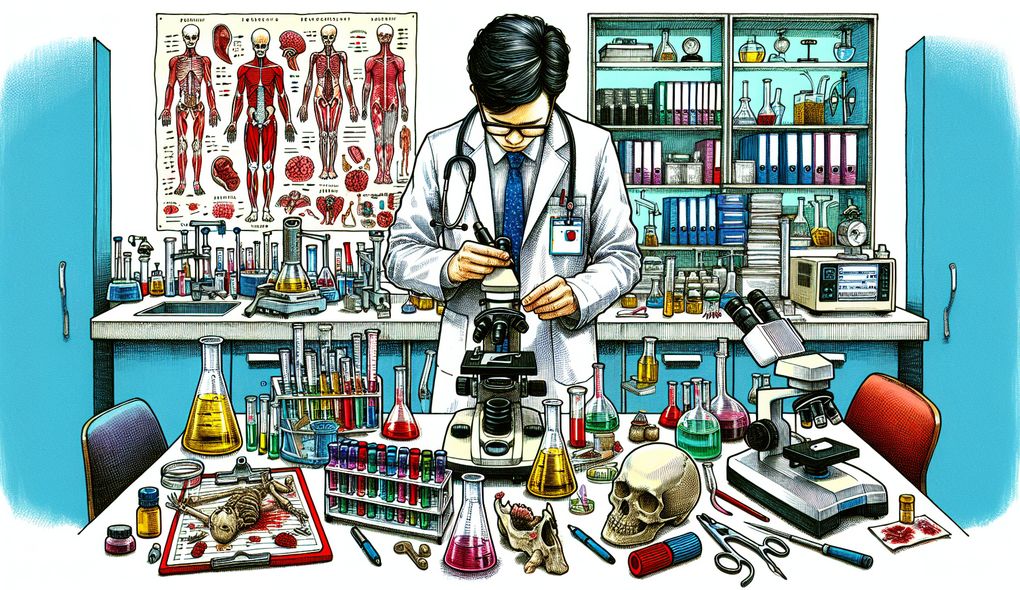What strategies do you use to effectively manage and mitigate potential biases in your work?
SENIOR LEVEL

Sample answer to the question:
I believe that managing and mitigating biases in my work is of utmost importance. One strategy I use is to constantly self-reflect and evaluate my own biases. This helps me recognize any potential biases that may affect my decision-making process. Additionally, I ensure that I am well-informed and knowledgeable about the latest research and advancements in forensic pathology. This helps me stay objective and make decisions based on scientific evidence rather than personal biases. I also collaborate closely with law enforcement and other professionals involved in the investigation to gain different perspectives and ensure a balanced approach. Overall, I prioritize transparency, open communication, and continual learning to effectively manage and mitigate biases in my work.
Here is a more solid answer:
As a Forensic Pathologist, effectively managing and mitigating biases is crucial to maintain the integrity of my work. One strategy I employ is continuous self-reflection to identify my own biases and recognize their potential influence on my decision-making process. This introspection helps me remain objective and make unbiased judgments based on scientific evidence. Additionally, I stay updated with the latest research and advancements in forensic pathology, ensuring my decisions are informed by current knowledge. Collaboration is another key strategy I use, engaging with law enforcement and other forensic professionals to gain diverse perspectives and ensure a balanced approach. By actively seeking feedback and opinions from others, I can overcome any potential biases that may arise from limited viewpoints. Lastly, I prioritize transparency and open communication in my work, making sure all findings, methodologies, and limitations are clearly documented and communicated to stakeholders. By adhering to these strategies, I can effectively manage and mitigate biases in my work as a Forensic Pathologist.
Why is this a more solid answer?
The solid answer provides specific strategies for managing and mitigating biases in the candidate's work. It also highlights how these strategies align with the required skills and responsibilities mentioned in the job description. However, it can be further improved by providing concrete examples or experiences demonstrating the candidate's successful implementation of these strategies.
An example of a exceptional answer:
Effectively managing and mitigating biases in my work is a priority for me as a Forensic Pathologist. To achieve this, I employ a multi-faceted approach. Firstly, I engage in regular self-assessment and self-awareness exercises to identify and acknowledge my own biases. This enables me to consciously challenge them and prevent them from influencing my decision-making process. Secondly, I actively seek out diverse perspectives by collaborating closely with law enforcement and other forensic professionals involved in the investigation. By bringing together a range of expertise and opinions, we create a more comprehensive and balanced evaluation of the evidence. Additionally, I continuously educate myself on the latest forensic research and advancements, attending conferences and staying up-to-date with relevant literature. This enables me to base my conclusions on the most current scientific knowledge, minimizing the impact of personal biases. Furthermore, I maintain open and transparent communication with stakeholders, ensuring that all findings, methodologies, and limitations are clearly documented and shared. Lastly, I advocate for an inclusive and unbiased work environment, fostering a culture where diverse voices are heard and respected. By implementing these strategies, I can effectively manage and mitigate potential biases in my work while upholding the highest standards of integrity and professionalism.
Why is this an exceptional answer?
The exceptional answer provides a comprehensive and detailed insight into the candidate's strategies for managing and mitigating biases in their work. It demonstrates a high level of self-awareness, initiative, and commitment to fostering an unbiased work environment. The answer effectively aligns with the required skills and responsibilities mentioned in the job description. It could be further enhanced by including specific examples or experiences where the candidate successfully implemented these strategies and achieved positive outcomes.
How to prepare for this question:
- Familiarize yourself with common biases that can impact decision-making in forensic pathology.
- Reflect on personal biases and consider how they may affect your work.
- Stay updated with the latest research and advancements in forensic pathology.
- Seek opportunities to collaborate with law enforcement and other forensic professionals to gain diverse perspectives.
- Practice open and transparent communication, ensuring all findings, methodologies, and limitations are clearly documented and shared.
- Educate yourself on inclusive practices and foster a culture where diverse voices are heard and respected.
What are interviewers evaluating with this question?
- Attention to detail
- Analytical and problem-solving skills
- Written and verbal communication skills
- Integrity and professional ethics
- Collaboration skills
- Knowledge in forensic tools and technologies

